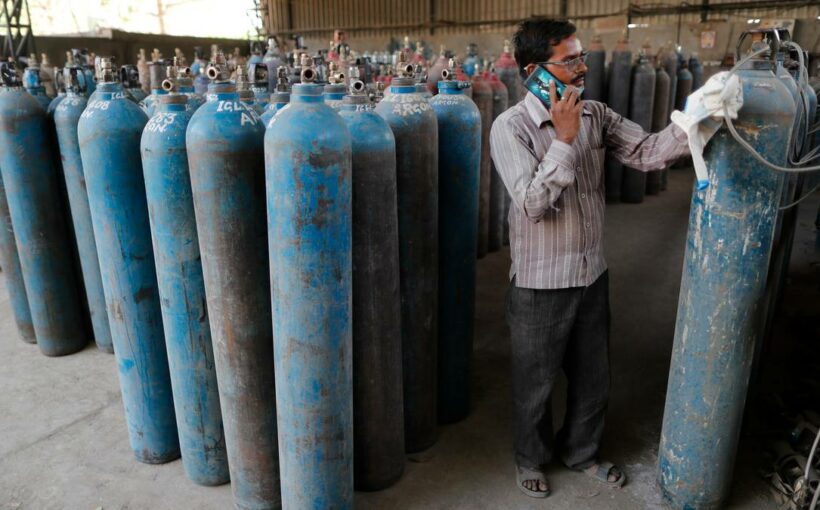One of India’s largest healthcare providers was forced to halt hospital admissions in Delhi on Friday (local time) over oxygen shortages, as evidence grows the country’s death toll is significantly higher than reported.
As India reported a record-breaking 332,730 new infections on Friday, there were desperate scenes in India’s capital as Covid-19 patients continued to die outsidehospitals as they waited for oxygen, or in transit as they desperately searched for a free bed.
Many smaller, private hospitals have also begun discharging severely unwell patients because of oxygen shortages, leading to fears Friday’s record number of 2263 deaths will spike further over upcoming days.
Max Healthcare, which operates two hospitals in Delhi, sent out an SOS tweet on Friday morning: “Less than an hour’s oxygen supplies at Max Smart Hospital & Max Hospital Saket, awaiting promised supplies from INOX since 1am. Over 700 patients admitted need immediate assistance.”
In a since-deleted tweet, the hospital group also announced it would be suspending further admissions until its oxygen supply stabilised.
The news was a major blow to desperate Delhiites searching for hospital admission for their loved ones. Only 25 of the city’s 4590 ICU beds are still available.
Residents told The Telegraph there were in reality no beds and any availability was due to a delay in updates from hospitals.
In the Saroj Super Speciality Hospital in Delhi’s Rohini neighbourhood, there are 172 patients – at least 64 of them critical and requiring high oxygen support – on a waiting list for 180 hospital beds.
Delhi’s Sir Ganga Ram Hospital reported 25 deaths over the past 24 hours among its “sickest” patients and Indian media reported the fatalities were because of the use of “low-pressure oxygen” because of partial shortages.
“Oxygen will last another two hours. Ventilators and Bipap [breathing support machine] not working effectively. Resorting to manual ventilation in ICUs and Emergency. Major crisis likely. Lives of another 60 sickest patients at risk, need urgent intervention,” the hospital said in a statement. Oxygen tankers arrived at the hospital two hours later.
On Friday, many smaller, private hospitals in Delhi were forced to discharge severe patients after they could only secure partial oxygen replenishments.
“It is like leaving a patient to die. There are no beds available anywhere else. We managed to get one here after pleading with doctors and running around for days. We cannot go anywhere else and we can’t be here either knowing that oxygen supply is limited,” the family members of a patient asked to leave Ishan Hospital in Delhi’s Rohini neighbourhood, told the Times of India.
At Delhi’s Pentamed Hospital, distraught family members of its 60 patients on high-flow oxygen were even asked to source their own oxygen cylinders to use inside the hospital, after management was left with several hours of supply remaining.
“I travelled 25 kilometres to Narela at a plant and stood there for five hours to get just one cylinder,” said Dharmendra Singh, whose wife is fighting for her life inside.
“This is what we have been reduced to. Why do we have governments then? What is the hospital doing when everything is to be managed by the patient’s family only.”
The hospital’s management told The Telegraph they had been given no choice because of the shortages.
“The situation here is really bad. As oxygen levels fall, our demand has fallen six times and we don’t have supplies left for longer than two or three hours. Otherwise, a life-threatening, catastrophic event is going to happen,” said Dr Mandeep Singh, senior consultant at Pentamed Hospital.
At GTB Hospital a makeshift ICU was set up outside the hospital, with motionless patients observed by overstretched doctors, already caring for patients inside, over CCTV.
On Thursday, a city-wide disaster had also been narrowly avoided by mere minutes, after a supply of oxygen from the neighbouring state was allegedly delayed.
Politicians in Haryana from India’s ruling Bharatiya Janata Party had said they would only deliver oxygen supplies once their own needs had been met, leading to a near-critical backlog in opposition-controlled Delhi.
At least six hospitals in Delhi said they had run out of oxygen until supplies arrived early on Friday morning and some had to resort to manual ventilation to keep patients alive.
“We again appeal to you with folded hands that if some quick and meaningful steps are not taken, then there can be a big tragedy in Delhi,” appealed Arvind Kejriwal, Delhi’s Chief Minister, to the Indian Government. “People are in a lot of trouble. We can’t sleep all night. Despite being their Chief Minister, I am not able to do anything.”
National fatalities are reported at more than 2000 a day but some put the real number at closer to 20,000.
In the city of Lucknow, in India’s most populous state of Uttar Pradesh, the official number of Covid deaths between April 11 and April 16 was 145, but two of the city’s main crematoriums alone registered more than 430 cremations in accordance with Covid-19 protocols.
British Prime Minister Boris Johnson has said the UK will seek to help India possibly with ventilators or therapeutics.
“We’re looking at what we can do to help and support the people of India, possibly with ventilators,” he said during a visit to Hartlepool.
“Thanks to the ventilator challenge, the huge efforts of British manufacturers, we’re better able now to deliver ventilators to other countries. But also possibly with therapeutics, Dexamethasone, other things, we’ll look at what we can do to help.”
A scramble similar to the one over oxygen supply is now emerging for cremations. Delhi residents report keeping the bodies of family members at home for several days until a slot opens up, while makeshift mass cremations take place in carparks.
Source: Read Full Article

/cloudfront-ap-southeast-2.images.arcpublishing.com/nzme/NEHL2IIK3XONRW2AEKOD3HZZFM.jpg)
/cloudfront-ap-southeast-2.images.arcpublishing.com/nzme/WT6IUJMSLBFTKU75UNZMACH7WU.jpg)
/cloudfront-ap-southeast-2.images.arcpublishing.com/nzme/ADGQL5EWPW37E7XWRNOO75KPQA.jpg)
/cloudfront-ap-southeast-2.images.arcpublishing.com/nzme/NJYYXNK2NHKRYSDSLVDDHIDIHA.jpg)